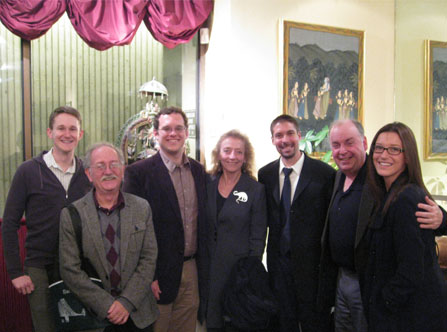Mustang Musicologists On the March

Mustang musicologists (and department chair) at the
American Musicological Society meeting held in San Francisco in November 2011.
Left to right: Byron Sartain, Craig Russell, Mike Joiner, Alyson McLamore,
Scott Dirkse, W. Terrence Spiller, Emma Levine.
What do you do with a Bachelor of Arts in music? Most freshmen music majors point to careers in performance or education as their expected goal. However, one of the ambitions of Cal Poly’s program is to introduce students to other options in music, allowing them to explore alternative disciplines, and often helping undergraduates discover talents they didn’t know they had, whether in composition, theory, sound design, scholarship or other fields. As our degree program reaches its 20th year, an impressive number of Cal Poly alumni have undertaken graduate studies in historical musicology or ethnomusicology; quite a few students now hold master’s degrees in one of those academic specializations, and several graduates have moved on to doctoral studies. Melissa Parkhurst (1997) is the first of our graduates to complete a Ph.D. in ethnomusicology, earning her doctorate in 2008 at the University of Wisconsin–Madison. Her dissertation, titled “To Win the Indian Heart: Music at Chemawa Indian School,” addressed the role of music in the education (and forced assimilation) of Native American children attending a federal boarding school in Salem, Ore.
Several master’s degrees in ethnomusicology have also been completed by Cal Poly alumni. Parkhurst earned her Master of Arts degree in 2000, again at the University of Wisconsin–Madison, with a thesis titled “Polka Women Playing Out: Gender and Performance in the Midwest.” Brian Harpst (2003) finished his master’s degree at Northern Arizona University in 2007 with his study “An Investigation into the Music of Astor Piazzolla, the Innovator of Tango Nuevo.” The most recent ethnomusicology master’s degree was awarded in 2011 by Arizona State University to AnneMarie Cordeiro (2008). Cordeiro investigated an elusive blues singer-guitarist in “Geechie Wiley: An Exploration of Enigmatic Virtuosity.”
Four Cal Poly music grads have now reached “ABD” status in historical musicology. ABD — All But Dissertation — is a term informally applied to the stage in the doctoral process when a student’s research topic for the dissertation has been approved (after all the required coursework has been completed and the doctoral qualifying exams have been passed). At the University of Michigan, Jessica Getman (2002) recently began work on a dissertation tentatively titled “To Boldly Go: ‘Star Trek’ and the Sound of the Sixties,” and Byron Sartain (2004) has been supported by Stanford University to conduct research in Paris. His dissertation considers “François Couperin’s ‘Pièces de clavecin’ and the Parisian Private Sphere.” UC Santa Barbara currently hosts two ABD Cal Poly alumni: Jessica Stankis (2004) is evaluating “Maurice Ravel as Miniaturist through the Lens of Japonisme,” while Michael Joiner (2006) is exploring the birth of music departments in the United States in his dissertation “Courses in Culture: The Acceptance of Music in the Late-19th-Century American University.” Two other alums enrolled in doctoral coursework at UCSB: Scott Dirkse (2005) and our newest musicology-bound graduate, Emma Levine (2010).
A number of master’s degrees in historical musicology have been produced by Cal Poly graduates at schools across the nation. A member of the Music Department’s third graduating class, Kevin Kishimoto (1996) addressed “Girolamo Dalla Casa’s ‘Il vero modo di diminuir’ (1584): Improvisation Performance Practices in Late Renaissance Italy” at UC Santa Cruz, in 1999. At that same campus in 2000, Keith Wyffels (1998) studied “The Romantic Agustín Barrios Mangoré: The Distinctive Style of a Conservative, yet Eclectic Guitarist-Composer.” Stewart Uyeda (2000) followed in the scholarly footsteps of Professor Craig Russell with his thesis “Francisco Delgado’s ‘Matins for the Virgin of Guadalupe’: A Casualty of Mexico’s War of Independence” for his 2004 degree from Claremont Graduate University. Three of our current doctoral students previously earned historical musicology master’s degrees at other universities: in 2006, Sartain completed “Design and Distinction: The Chamber Music of Arthur Foote in the Age of the City Beautiful” at the University of Wisconsin–Madison, and that same year, Stankis finished “Rethinking Cécile Chaminade’s Concert Tour of the United States, 1908” at Arizona State University. The “farthest-from-home award” goes to Getman, who studied “The ‘Air de Joconde’: A Survey of an 18th-Century Timbre” at Boston University in 2008.
The rich array of research topics pursued by these alumni comes as no surprise; all of these graduates are bright, motivated students, and the majority of them graduated cum laude, magna cum laude, or even summa cum laude from Cal Poly. They all were active performers; half of whom presented recitals as their Cal Poly senior projects, while the others blended scholarship with music-making by means of a broad selection of lecture-recital topics.
Our graduates are awash with suggestions for their younger Cal Poly classmates who might be curious about musicological fields for further study. They urge students to consult with Cal Poly faculty to get a better understanding of the disciplines, and they advise students to talk as much as they can with both students and faculty at prospective graduate schools to ensure the best “fit” (and repeatedly, they offer to talk to any interested students). They advise potential musicologists to take as many undergraduate history or ethno courses as possible. “It’s never too early to start studying German!” they admonish. They recommend students read beyond the assigned music history textbooks to see how scholars present research and make arguments. And they exhort students to “remember that you are doing what you love” — a good reminder for all of us who are fortunate enough to study music every day.

